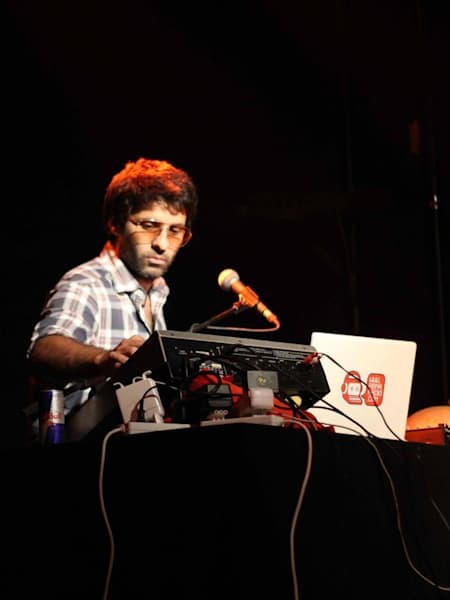He’s the man most often credited with kickstarting the underground Arab music scene (certainly in his homeland of Lebanon), so it’s no surprise that, in 2006, Zeid Hamdan was the first musician from the Arab world to be invited to participate in Red Bull Music Academy – the annual event which sees renowned producers, composers and performers from all over the world offer their expertise to some of the most talented up-and-coming underground artists. (The Academy moves to a different city each year. In 2006, it was held in Melbourne.) Coincidentally, Hamdan was at the Academy at the same time as Oddisee – the Sudanese-American hip-hop artist he’ll be opening for at Stereo Arcade in Dubai on Wednesday, October 5. Also at the Academy that year: Aloe Blacc, the American vocalist behind Avicii’s monster hit “Wake Me Up”, and acclaimed electro artist Flying Lotus. “Oh my god! What a great year,” says Hamdan when we remind him of his fellow Melbourne alumni. “That’s so cool.”
Hamdan’s experience at the Academy was, he says, “amazing”.
“I think what’s clever is the way they select people with, somehow, the same vibe, the same openness. Somehow they see whether you’d be a good person to blend in with the others and communicate and exchange. It’s a very clever process of selection.”
He remembers the venue with affection too. “We were in an old warehouse that was customised for us by local artists and on each floor there were installations. One floor had seven studios, and an equipment room with all the equipment you could dream of. You had companies trying gear out on us, you know? They’d put their gear there and let us play with it. A lot of tracks that I produced later were initiated there, through playing with some gear.”
The Academy focuses strongly on collaboration (there are always far fewer studio rooms than invited artists, forcing – in the nicest possible way – participants to work together on their creations), so Hamdan should’ve felt right at home. It’s something he’s encouraged throughout his career, from his early days with Yasmine Hamdan (no relation) in the seminal duo Soapkills, through numerous iterations of the ever-shifting lineup for Zeid and the Wings, to his current work – particularly his separate projects with two Egyptian singer-songwriters: Maii Waleed and Maryam Saleh.
Mayssa Jallad, vocalist in Beirut-based indie duo Safar, and sometime member of the Wings, describes Hamdan as a “free spirit”. “It’s been a pleasure and an honour accompanying him,” she says. “He’s been so generous with me, sharing his knowledge and contacts and advice. Soapkills was a milestone, it had a huge impact on reimagining what Lebanese or Arabic pop music should sound like.”
For Hamdan, sharing ideas and expertise is vital to what he wants to achieve. “My real interest, musically, is those people who explore and push the boundaries of Arabic music. I could do English pop or English rock or blues, but it’s important to have music that’s unique. It’s really a challenge to make Arabic sound nice in pop music. That’s why I like working with Maii – I really love her sense of pop music and her lyrics – or Maryam – who I think is like a punk artist. They inspire me and they’re really great to work with, because they show me how it can be done in a very beautiful way.”
Hamdan adds that he finds it much easier to produce other artists than to produce his own work. “When I’m on my own, it’s like working in the dark. I cannot evaluate it. So releasing a song can take me years and even then I’m never sure about it. When I’m working with another artist, I’m much more able to have a sense of whether it’s good or not. It’s like when you listen to your own voice, or when you look at a picture of yourself. You don’t know if you sound good or look good.
Self-appreciation is very hard, and I have issues with myself anyway.”
Very few other artists seem to have any issues with Hamdan, though. He’s as in demand as ever. A couple of days after his Dubai gig, he plays Paris for the Festival d’Île de France with Maryam Saleh. He’s producing Lebanese artist Khaled Mouzaner’s new album, and he’s been scoring a lot of movies, including Barakah Meets Barakah, a Saudi indie film that’s been getting excellent international reviews.
And he retains the thirst for exploring new sounds in Arabic music that first inspired Soapkills. His latest release, “Flot Hal Slah W Rtah”, a track he threw up on Soundcloud because he didn’t feel it merited a slot on his upcoming album, is his attempt to “mix Arabic and Afro-funk”.
“I don’t know if it’s good or not,” he says. “As usual, I don’t really have any reference point for what I’m doing.” Which is a neat summary of his career. Zeid Hamdan: The man with no reference points.




